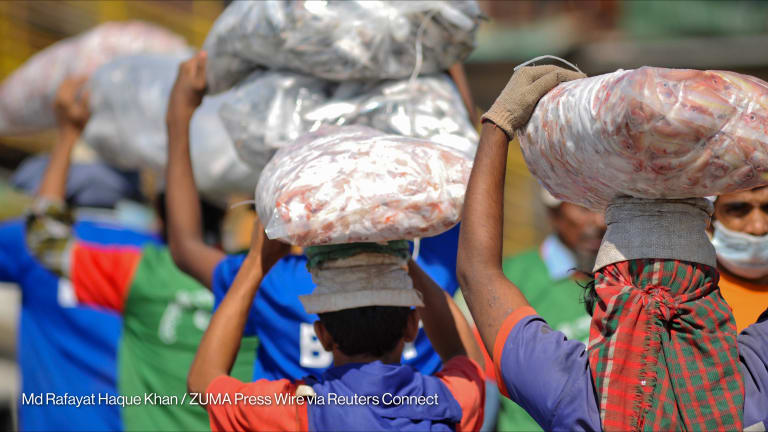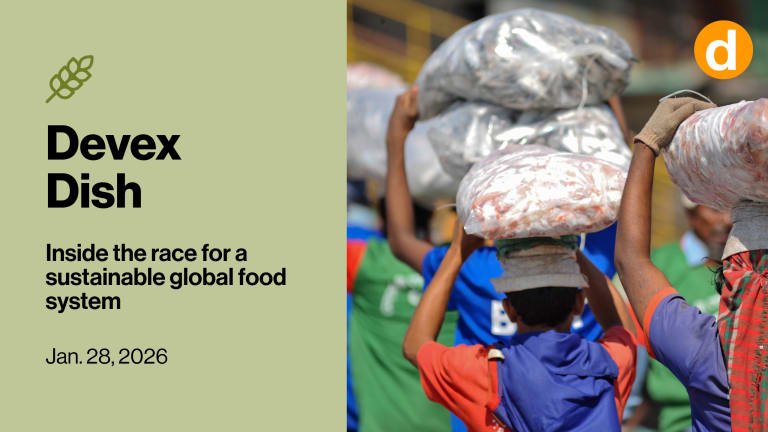
Kenya loses almost half of its farm produce to poor roads, production gluts, and policies that fail to promote local agro-processing, according to Patrick Nyangweso, business development manager at the Kenya National Chamber of Commerce and Industry.
Establishing agro-processing zones close to farmers — providing value addition — can reduce these post-harvest losses.
Though the Kenyan government has begun the process of establishing six agro-processing zones and its 10-year agricultural sector development strategy identified value addition as key to transforming the sector, local entrepreneurs say that progress has been too slow and that additional investment in the industry is needed.
‘A game changer’
"Local agro-processing is a game changer. It is a sustainable way in which investors can work with farmers to reduce food waste and boost food security during this era of uncertainties," said Grace Mueni, a horticulture consultant.
In Tharaka Nithi county in the lowlands of Mount Kenya — a region that often experiences erratic weather — farmers working with innovators are turning produce into finished products that reach consumers as far as the United States.
Mercy Mwende, director at local agro-processor Sweet ’n’ Dried, said her company has been sourcing fruits, vegetables, spices, and orphan and traditional crops from over 3,000 farmers to process into finished goods.
"When there is a glut in production, the roads are impassable, [and] the local market is too flooded, farmers have nowhere to take their produce,” Mwende said. “But my company has been helping farmers cut ... post-harvest losses because it is close to the farms."
“Local industries that are working with farmers need to be protected from cheap imports to ensure they continue supporting rural economies.”
— Justus Lavi, national secretary, Kenya Small Scale Farmers ForumThe finished products are sold locally in central Kenya and the capital, Nairobi, and exported to the U.S.
Agro-processing currently contributes 2.4% to national employment and 3.2% to Kenya's gross domestic product, while accounting for 8.5% of exports, Nyangweso said.
Apart from the returns that farmers get when Mwende's Sweet ’n’ Dried buys their produce, the factory has 20 full-time employees and an additional 30 workers during the peak season.

Slow growth
Despite the potential, Mueni said local agro-processing factories still struggle to remain operational due to challenges such as poor roads and a lack of electricity, water, and network connections.
Mwende added that the industry’s growth has also been slow due to a lack of financing to address such challenges and that it would benefit from more support from the government or private sector investors.
Competition with imports from higher-income countries is another challenge that is slowing the takeoff of local agro-processing, according to Justus Lavi, national secretary at the Kenya Small Scale Farmers Forum.
Kenya signed an economic partnership agreement with the United Kingdom in 2020 that will gradually reduce or remove tariffs on U.K. products similar to what local agro-processors are putting on the market.
But the same kind of overseas markets lock out fresh produce exports from lower-income countries such as Kenya, citing a failure to comply with phytosanitary measures at the farm and in transit, Lavi said. He added that the impact of the U.K. agreement will be “disastrous” on farmers.
“Local industries that are working with farmers need to be protected from cheap imports to ensure they continue supporting rural economies while also providing solutions for emerging challenges like climate change and COVID-19," he said.
Finding solutions
Hailemariam Desalegn, board chair at the Alliance for a Green Revolution in Africa, stressed the importance of private sector involvement. He said those in the private sector should partner with governments to source funding from multilateral financial institutions to invest in productive sectors in the agriculture value chain.
“We need to work in partnership to support small-scale food producers to get nutritious foods to markets at low cost,” Desalegn said at a recent meeting between AGRA, the private sector, and the government.
Last year, the Kenyan government announced that it had begun to develop six agro-processing zones across the country that would be private sector-driven.
Part of our The Future of Food Systems series
Find out how we can make food fair and healthy for all. Join the conversation using the hashtag #FoodSystems and visit our The Future of Food Systems page for more coverage.
The government has identified land where the sites will be established and is in the final stages of arranging funding from the African Development Bank to finance the agro-processing zones through the private sector, according to Thule Lenneiye, coordinator of the agriculture transformation office at the Ministry of Agriculture, Livestock, Fisheries and Co-operatives. Five of the six agro-processing hubs will be established by the end of the year.
Under the Feed Africa strategy, AfDB has funded governments to establish agro-processing zones in countries such as Nigeria, Liberia, Tanzania, Sierra Leone, and Ethiopia, said Philip Boahen, chief agriculture policy economist at AfDB, during a recent webinar.
In Ghana, such zones have helped maize, soy, and rice farmers increase the area of crops from 1,000 to 8,000 hectares, with the processed products serving both domestic and regional markets.
"The bank provides financial and technical capacity for governments to design these projects with the private sector,” Boahen said. “We view this as an opportunity for women and youth to have sustainable jobs within this ecosystem."
Visit the Future of Food Systems series for more coverage on food and nutrition — and importantly, how we can make food fair and healthy for all. You can join the conversation using the hashtag #FoodSystems.

Search for articles
Most Read
- 1
- 2
- 3
- 4
- 5








